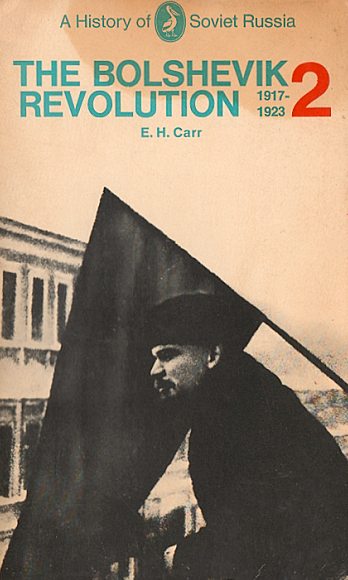
A few days ago I was looking through a box of old papers, vintage ca. 1970, and I found a copy of the 1966 Pelican edition of Volume 2 of The Bolshevik Revolution by E.H. Carr. Since the book hasn’t seen the light of day in forty-odd years, it’s in pretty good shape. I bought it in 1968 — for 9s6d, or about 48p, as a matter of interest — when I was studying for A-levels. My history teacher recommended that anyone who was planning to sit special papers (which I was) should read it in preparation for the exam.
E.H. Carr, if not an outright communist, was definitely a communist sympathizer and an apologist for Stalin. But that doesn’t detract from his work as a historian — like many of the comsymp historians, he was from the old school: researching history meant studying the facts and writing them up, with thorough annotation of sources. A historian might color his narrative with his own opinions, but he didn’t scamp the facts.
The same was true of Isaac Deutscher, an actual communist, whose biography of Stalin was also on my reading list back then. I read those books and others, discounted the bias of the writers, and accumulated a vast store of information about the Bolshevik Revolution and Soviet Russia, some of which is still stuck in my head today. Reading history written by commies never improved my opinion of communism — in fact, some of the ghastly truths about Lenin, Trotsky, and Stalin contained in those books hardened my attitude even further. A few months ago, when I was arguing with Felix Quigley (who was our resident Marxist commenter for a while), he wanted to know where I got my bogus information about Lenin. My source was in fact the book shown above — I couldn’t remember the author’s name at that point, but I told him it was written by a communist or communist sympathizer.
Facts is facts. And they’re in there.
This book was the second of three volumes on the Bolshevik Revolution, which themselves were part of a series on the history of Soviet Russia. The blurb on the Pelican book says there were eight volumes, but I thought there were about fourteen — maybe Carr wrote more of them after 1966.
Anyway… The font size in the book is microscopic, so I know I’ll never read it again. Oh, for the days when I could read those tiny little black letters!
So here’s my proposal: I’ll put this in a book mailer and send it to anyone in the USA who would be interested in reading it. It’s in good condition; the spine is intact. There’s only a bit of yellowing and that coffee stain from 1968 at the top. I’m restricting it to recipients the USA because book rate is cheap, so I won’t mind paying the postage.
If you’d like it, email me with your address at gatesofvienna (at) chromatism (dot) net. A week from today I’ll compile a list of interested parties (if any), have Dymphna choose one of them at random, and mail it off to the lucky winner.
This book is dense with information. I noticed that there’s a big section on the NEP in the second half of it. That’s one of the more interesting developments in the early history of the Soviet Union.

You can read or download it in bigger print at https://ia800309.us.archive.org/1/items/bolshevikrevolut006132mbp/bolshevikrevolut006132mbp.pdf
And thanks for the tip.
May I recommend the new film “The Death of Stalin,” now out on DVD. It will amuse to no end.
Idle thought: I wonder whether it’s feasible — legally, technically, economically, time-management-wise — to make a photographic copy of the pages of this book and put it online; in effect, to make an email version of this book from the 1960s. Probably not.
Oh, wait. Tom Simon above has an answer. Thanks.
Thank you, Tom.
I was able to download a copy of the book. For obvious reasons, in the current climate, it behooves one to maintain hard copies of important information when at all possible.
I consider it a high priority to help educate those around me regarding the realities of the various communist revolutions. Americans, in particular, were spared the life experience and associated memories of battling communism in the last century.
It’s my belief that our time is limited in regard to utilizing (at least superficially) free and open communications via the internet. The latest wave of reporting out of China in regard to it’s “social credit score” (a truly depraved euphemism) has convinced me that we are but mere years away from de facto gulags.
As bleak as things are at this moment, I will not give up. I will do all I can to inform, educate, and persuade anyone willing to listen.
So, an historical account of the Bolshi’s written by an actual communist will be very helpful in providing persuasive evidence to some of the more resistant folks I encounter.
This may seem off topic, but bear with me; I recall a conversation, some years back, with a fellow-obsessive collector of recordings of classical music (this was when downloads were new, and streaming wasn’t available). We speculated that the advent of the Internet should mean that everything ever recorded would be available in perpetuity.
In practice, it hasn’t worked out that way; even ignoring questions of sound quality, commercial considerations mean that, despite the efforts of some independent labels, much that should be readily available isn’t. So, besides hanging on to your LPs and CDs for music, keep your printed copies of the written word, which are additionally susceptible to censorship! In theory, like sound recordings, they should always be accessible through archives like the Library of Congress, British Library etc, but who knows?